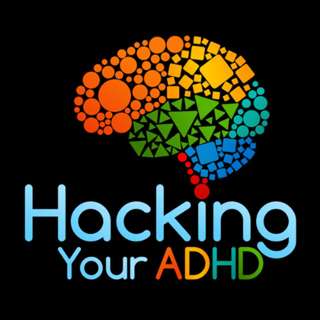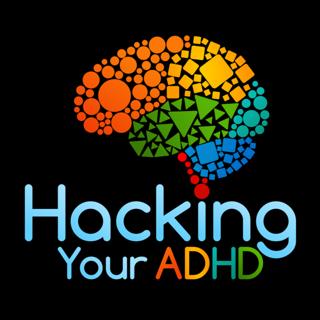
How to do Hard Things - Part 3 (Rebroadcast)
All right, I’m back from my little break and we’re just heading right back into the hard stuff - or at least how we can start getting it checked off our to-do list. Today we’re going to be looking at some more ways that we can adjust our mindset around doing hard things and also looking at some of the reasons we might be choosing to do certain hard things. Then we’ll finish up this series by digging into a few of the more concrete things that you can do so that you can tackle those hard things. Support me on Patreon Ask me a question on my Contact Page Find the show note at HackingYourADHD.com/hardthingspart3 This Episode’s Top Tips Part of the reward of doing hard things is actually doing the hard things - this may seem glib, but when we’re building up our habits and routines the only way we actually build them is by doing the hard parts. We can’t skip to the end and expect to have picked up habits needed to maintain that goal. We can reshape our mindset around the things that we “have to do” - we often rebel against the have to’s and so changing our mindset into things that we get to do can have a profound impact on how we approach doing those tasks. Two of the best ways to get through doing hard things is to know your why behind what you’re doing and then having some accountability to help you follow through.
22 Maj 202318min

How to do Hard Things - Part 2 (Rebroadcast)
Last week we began this series on how to do hard things and looked specifically at how we define hard things and ways that we can work through some of our problems so that they can become more manageable. This week we’re going to be continuing that conversation but with a lens that focuses on why it can be so hard for us to even attempt to do hard things. We’ll be looking at some of the misconceptions we have about doing hard things as well looking at how acknowledging the hard things we’ve done in the past can help us do more hard things in the present. Support me on Patreon Ask me a question on my Contact Page Find the show note at HackingYourADHD.com/hardthingspart2 This Episode's Top Tips We often discount our ability to do hard things from a mistaken belief that we’ve never been able to accomplish anything hard. When we mistake failing at simple things for failing at doing hard things it can reinforce the idea that we can’t do hard things. Remember, just because something is simple doesn’t mean it isn’t hard. Don’t assume the logic in your head is always actually logical. It is easy for us to make logical leaps that don’t hold up to reality - slow down and examine those beliefs. You don’t have to believe everything you think.
15 Maj 202315min

How to do Hard Things - Part 1 (Rebroadcast)
One of my favorite sayings from Brendan Mahan of the ADHD Essentials podcast is that ADHD is life on Hard Mode. The executive dysfunction that comes with ADHD makes everything just a little bit more difficult. From doing the dishes to filling out tax returns we find ourselves needing to put in more effort than our neurotypical peers. But what’s important for us to remember is that while these things can absolutely be harder for us to do, it doesn’t mean it’s impossible. Today we’re going to be exploring this idea of doing hard things - what makes something difficult and how we can work on moving ourselves through that process. Support me on Patreon Ask me a question on my Contact Page Find the show note at HackingYourADHD.com/hardthings This Episode's Top Tips It is important for us to define what we find being hard because when we choose to believe something should be easy we tend not to give it the attention that it deserves. Our problems can’t be solved until we acknowledge them as problems - but also can’t solve those problems unless we put forward the effort of defining them and acknowledging the underlying issues. Define what done looks like for a task and be sure to be mindful of how that can be functional in your life.
8 Maj 202317min

ADHD and the Fawn Response
Hey team, Recently when I was talking with my therapist, they mentioned that it seemed like I would frequently go into the fawn response - I was a little taken aback by this because while I felt like I’d heard of the fawn response before, it wasn’t something I was familiar with, or even could even particularly put my finger on what it was. Fortunately for me, I run a podcast where I can dive into topics and gleam a bit more understanding about things I’m interested in. While most of us have probably heard of the fear responses of fight, flight and freeze, there is also a forth response known as fawning. In today’s episode we’re going to be looking at all the fear responses as well as looking at how we can start working on better controlling those responses. Support me on Patreon Ask me a question on my Contact Page Find the show note at HackingYourADHD.com/140 This Episode’s Top Tips When faced with a threat, our body's automatic response can be fight, flight, freeze, or fawn. Fawning behavior is a trauma response that involves people-pleasing to avoid abuse. People-pleasing can become a problem when it is done compulsively and to the detriment of one's own self-interest. It is important to be mindful of our emotions and identify when we are in a fear response. While fear is a healthy emotion that can help protect us, we don't want it to control our actions. 4. Identifying and acknowledging our emotions can be helpful, and seeking therapy can also be beneficial.
1 Maj 202311min

Finding Your Path with Shell Mendelson
Hey team, this week I had a great conversation with Shell Mendelson, a career counselor who specializes in working with adults with ADHD. We talk about how traditional career advice often doesn’t work as well for ADHD, how we don’t want to dictate success purely on financial outcomes, the importance of deadlines, and whether or not we should consider disclosing our ADHD at work. Support me on Patreon Ask me a question on my Contact Page Find the show note at HackingYourADHD.com/139 This Episode’s Top Tips Traditional career advice doesn't always work for people with ADHD. Many of us ADHD often have difficulty finding the right job because we can feel resistance to taking instruction and we often need accommodations to do our best work. When considering disclosing your ADHD at work it is often better to consider a self-accommodation process first and then having a win-win conversation with your boss about how you do your best work. When considering entrepreneurship and self-employment it is important to way the pros and cons of being your own boss. While we can focus more on what makes us happy we also have to find a balance with prioritizing our most important tasks.
24 Apr 202347min

The Value of Inconsistency with Kristen Carder
Hey team, this week I’m talking with Kristen Carder, the host of the I Have ADHD podcast - in this episode, we dive into the nitty gritty of ADHD and how advice for neurotypicals often doesn’t work for those of us with ADHD. We often hear about the need to be consistent, but with ADHD, not only is that hard, it can feel downright impossible. Instead, Kristen and I discuss how we can embrace our inconsistency and instead focus on being persistent. Support me on Patreon Ask me a question on my Contact Page Find the show note at HackingYourADHD.com/138
17 Apr 202339min

Executive Function (Rebroadcast)
Executive function is a hot topic around ADHD - and more specifically how we often have a deficit in it. One of the trickiest parts about executive function is that there isn’t a universally accepted model of executive functions - I know that feels kind of surprising because it seems like something that is talked about as much as executive functions is that we’d have something that is generally agreed upon. So for this episode, we’re going to be focusing on Russell Barkley’s self-regulation model - although I’ll certainly be pulling from other sources as well. I really like Dr. Barkley’s model of self-regulation, because in many ways we can actually look at ADHD as a disorder of self-regulation itself. And that’s exactly what Dr. Barkley proposes, that executive function and self-regulation are the same thing and that with ADHD we have a deficit in our executive functions and therefore a deficit in our self-regulation. As such, I’ll be using executive function and self-regulation interchangeably throughout the episode to help emphasize that they are the same thing. In this episode, I’m going to go into exactly what executive function and self-regulation are, how we use them and how we can get back on track when we find ourselves missing some of that self-regulation. Support me on Patreon Ask me a question on my Contact Page Find the show note at HackingYourADHD.com/executivefunction This Episode’s Top Tips We can think of executive functions and self-regulation as the same thing. Our primary executive functions are working memory, cognitive flexibility, and inhibitory control. We have a limited resource pool for our executive functions and we use some of it every time we engage in self-regulation. Fortunately, we can help restore some of these resources by doing things like taking a break, having a snack, and getting some exercise. One of the best ways to help with executive function is to modify our environment so that we’re reducing the amount of self-regulation we need to do. This means doing things like putting away distractions and making time more visible.
10 Apr 202319min

Traveling and Invisible Disabilities with Daw Barclay
Hey team, this week I’m talking with Dawn Barclay about her book, Traveling Different: Vacation Strategies for Parents of the Anxious, the Inflexible, and the Neurodiverse. Regardless of whether or not you have kids, traveling can be difficult when you have an invisible disability, such as ADHD. There are so many things that we have to keep track of, and even when we get there, there are still a host of things that our ADHD can make even more difficult. Dawn has spent her career working in the travel industry as well as working as a travel writer. She wrote this book as a guide to what she wished she had 20 years ago. In our conversation today we talk about some of the many difficulties that come from traveling with neurodiverse children (and ourselves) and then what we can work on doing to help alleviate some of those stressors. Support me on Patreon Feel free to ask me a question on my Contact Page Find the full show note at HackingYourADHD.com/137
3 Apr 202338min





















